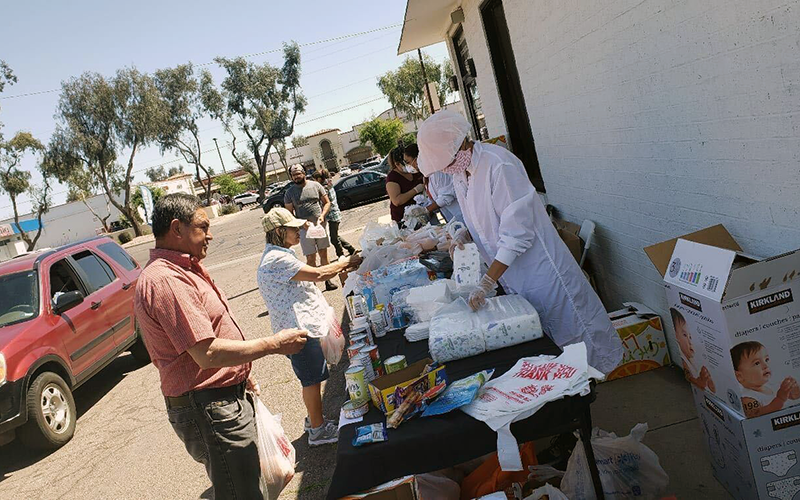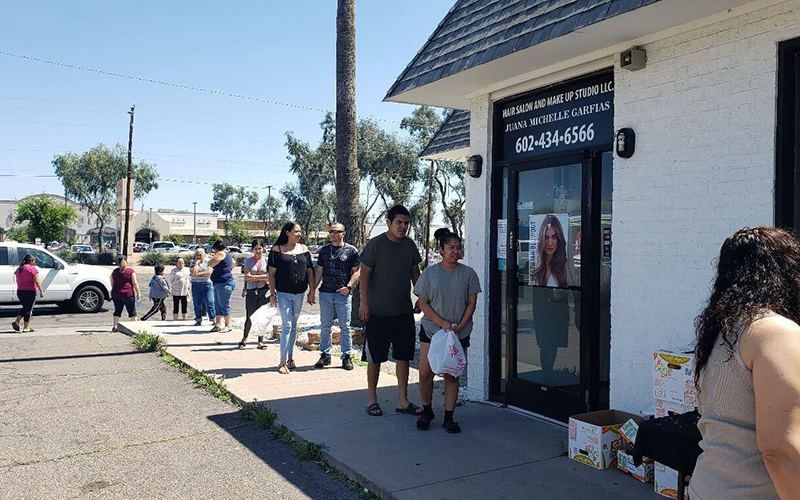- Slug: BC-CNS-COVID Aid,720
- 2 photos available (thumbnails, captions below)
By Katelyn Reinhart
Cronkite News
PHOENIX – With grocery stores picked over by panicked shoppers and relief checks slow to arrive in mailboxes, Arizonans are coming together to distribute goods and services to those in need through grassroots “mutual aid” groups that target the most vulnerable.
The idea of mutual aid is not new, and it’s not the same as a donation. For example, a person may offer a service to a friend, and that friend would reciprocate with his or her own service. The concept applies to communities as well, when different organizations come together to look after one another by sharing and exchanging supplies, time and resources.
Harrenson Gorman is a co-founder of Desert Indigenous Collective, a group begun amid the rise of the novel coronavirus. Its members have been providing food and cleaning supplies across Phoenix with a focus on helping the elderly, homeless, marginalized and immunocompromised.
Gorman, who is Diné – the name Navajo people call themselves – wanted to develop a support system after seeing the insecurity brought on by COVID-19, the disease caused by the coronavirus. Looking for a way to help, he noticed groups in other states that are taking a different approach to community wellness: mutual aid networks.
The Navajo Nation has the highest per capita rate of COVID-19 cases in the country compared with individual states. As of June 29, there were 7,532 cases and 363 deaths among the 173,000 people who live on the vast reservation.
The numbers were not lost on Gorman. “We developed our collective in hopes of providing a system of support for one another,” he said.
The collective comprises a core group of about seven individuals who shop and then sanitize, make care packages and sanitize again, make deliveries or drop-offs and then sanitize once more.
Since March, Desert Indigenous Collective has helped about 15 families in the Phoenix area with items ranging from pet food to paper towels. Those who request assistance receive supplies in bulk intended to last up to two weeks. The work is almost entirely funded by online donations and community support, with some funding coming directly from collective members, who balance this work with full-time jobs.
Other resources in Arizona include Mutual Aid Phoenix, which aims to help underserved individuals through the sharing and redistribution of resources. It was created to be a formal reflection of what was already happening within communities, said Parris Wallace, director of Black Phoenix Organizing Collective and a founder of Mutual Aid Phoenix.
“Historically speaking, we have always taken care of one another,” Wallace said. “When this pandemic happened, the effort became more coordinated.”
Mutual Aid Phoenix, which launched in March, has helped about 50 families with such essentials as food, water and cleaning supplies, Wallace said. It now has nearly 4,000 followers on Instagram.
“Mutual aid, as a practice, is not charity,” Wallace said. “Taking care of one another and making sure no one goes without, that’s what we’ve rooted ourselves in.”
Mutual Aid Phoenix and Desert Indigenous Collective started in response to the COVID-19 pandemic, but some existing groups are ramping up activities as well.
“De Mujer a Mujer” is a Phoenix radio show that has helped provide food and clothing to low-income people for the past five years. Founder Naye Olvera expanded those efforts three months ago to provide COVID-19 relief.
Donation options include helping with groceries or a rent payment. De Mujer a Mujer has helped almost 1,700 individuals with food donations, and 10 families received rent assistance.
“A lot of people have been out of work, and now that the kids are home all day, it gets a little bit more expensive for the parents,” Olvera said. “It’s really hard for the families to pay rent.”
James Carlson, who has been a social worker in Arizona hospitals for the past five years, said some marginalized communities, like those experiencing homelessness, often benefit the most from community support.
“If a patient or client is worried about … where they’re going to have a safe place to lay their head at night, I think social justice precautions kind of go to the wayside,” he said.
It is encouraging, he said, to see people band together to invest time and resources into those most in need.
“Community buy-in right now is huge,” Carlson said, “because we’re in the middle of a pandemic that affects all of us.”
For more stories from Cronkite News, visit cronkitenews.azpbs.org.
^__=
Volunteers with De Mujer a Mujer hand out food and supplies to Phoenix families on April 11. The organization is one of many working to aid Arizonans during the COVID-19 pandemic. (Photo courtesy of COVID Más Unidos que Nunca)
Arizona residents line up on April 11 to receive supplies from De Mujer a Mujer during the pandemic. Other aid groups include Mutual Aid Phoenix, which focuses on sharing and redistributing resources to those in need. (Photo courtesy of COVID Más Unidos que Nunca)

